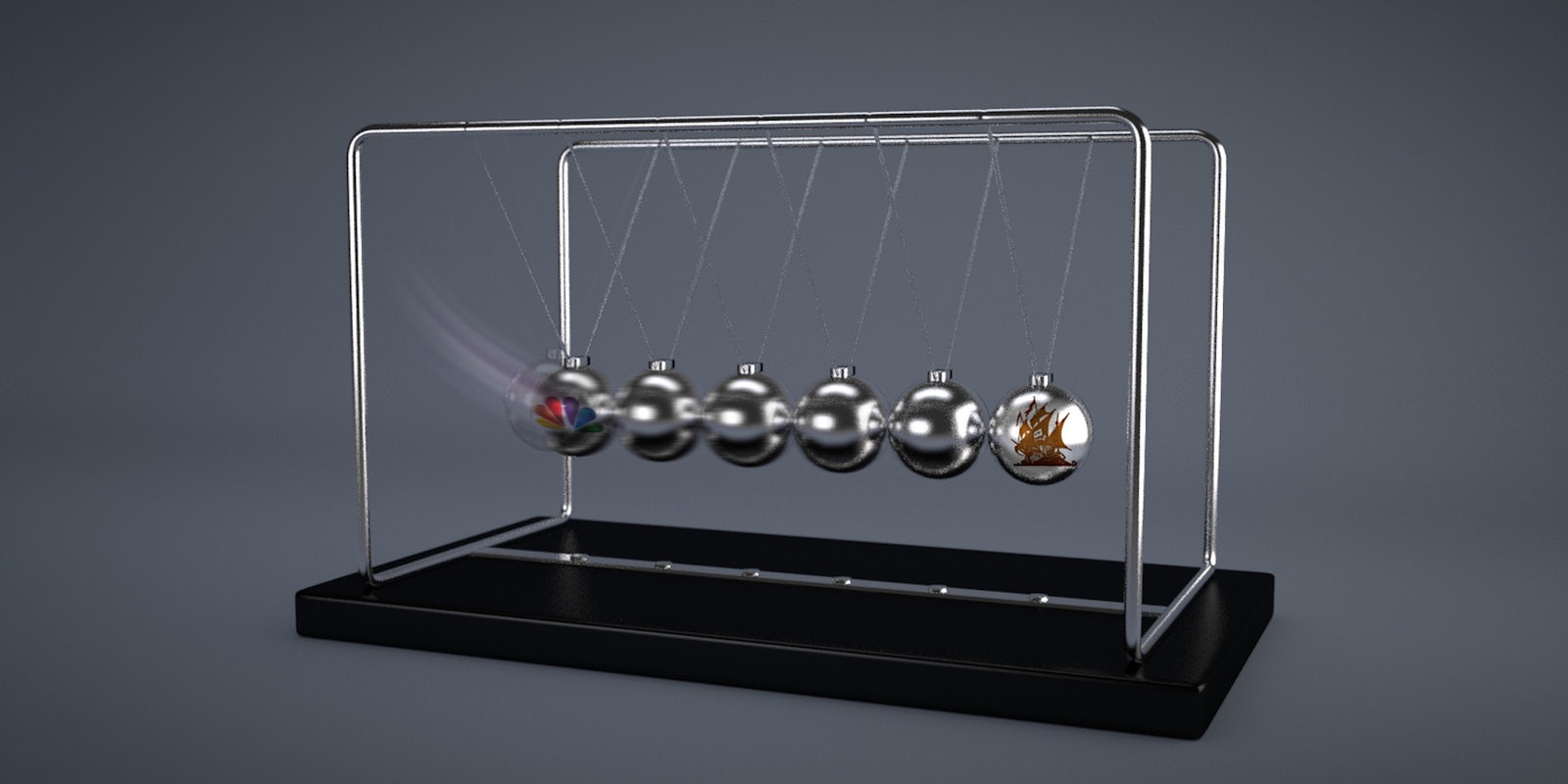Trying to figure out who’s telling the truth in the finger-pointing world of Internet piracy studies was a mess before we took note of who was actually paying for the research.
Just look at these headlines, all published in just the past few years: Illegal downloading is killing Hollywood, says an article syndicated by Reuters. Piracy is killing the music industry, say a bunch of big-name musicians. Piracy doesn’t actually hurt the music industry, says the Washington Post. Piracy is helping the entertainment industry, says Business Insider.
The debate over media piracy is neverending. There are a thousand different studies out there, each of which seems to prove any one nuanced point that industry lobbyists or “copyfighting” freedom activists care to make.
Research exists to support each of these claims, and every claim in between. Every one of these studies gets significant press coverage, but there’s rarely any attempt to resolve their competing conclusions. So I decided to look just a little closer at this heap of studies, searching for a pattern.
I found just one: If a study was funded by a company that produces online content—even if it was conducted by outside academics—it would find a correlation between digital piracy and lost sales. If there wasn’t that funding involved, it usually didn’t.
•••
Here are a few music piracy facts, all of which come straight from data-driven academic studies. I have no reason to doubt any of their findings.
- Piracy reduces how long albums spend on the pop charts (University of Connecticut)…
- …but albums that get pirated the most don’t see a corresponding dent in sales. (Hitotsubashi University)
- Pirates actually spend more money on legal downloads than non-pirates (University of Amsterdam)…
- …but piracy means fewer CD sales. (University of Texas at Dallas)
- Among college students who pirate lots of music, every five downloads is equivalent to about one lost sale (University of Pennsylvania)…
- …but seriously. Pirates spend way more money on legal downloads than non-pirates. (Columbia University)
- Apple loses money when college students pirate more music, because they purchase fewer legal iTunes downloads (Chinese University of Hong Kong)…
- …but Apple gains money when college students pirate more music, because they purchase more iPods. (That same study.)
The only definitive takeaway from that body of research is how difficult it is to navigate its nuances, let alone make a black-and-white conclusion about whether piracy hurts or helps the artists and companies who create and sell media.
But that doesn’t stop content industry groups from paying researchers to try.
•••
Before I go further, I want to establish the players and the stakes. You may or may not care about how easy it is to get online content without paying for it, or whether a movie studio or record label meets its bottom line each year. But the two major trade industries at play here—the Motion Picture Association of America for movies, and the Recording Industry Association of America for music—very much do.
They have a decades-long history of attacking whatever they perceive as cutting into their profits. And while these groups represent those who make much of the music, movies, and television that you love, they also tend to attack other things you might love just as much, like the burnable CD, the VCR, and now the Internet.
You may remember the MPAA, and to a lesser extent the RIAA, for the role they played in the Stop Online Piracy Act (SOPA), that controversial bill that was defeated in January 2012 after massive public outcry over what it would do to the Internet. The premise of SOPA went like this: new URLs of pirated files go up all the time. Whenever a big company sees their file, they have to issue a full report, and by law, the website owner has a period to take it down. That’s too slow, they said, so those companies wanted the power to have websites removed immediately if they found it infringing.
You can probably tell why that pissed people off.
What’s more, the MPAA and RIAA fought tooth and nail for decades to stop practices they think cut into their revenues. In 2005, the then-CEO of the RIAA claimed that “CD burning is a problem that is really undermining sales” and called for digital locks on CDs. Before that, the RIAA enacted a formal plan to sue the pants off of repeat BitTorrent pirates.
Perhaps most infamously, in 1982, Jack Valenti, then the chair of the MPAA, testified the evils of the VCR to Congress. “The VCR is to the American film producer and the American public as the Boston strangler is to the woman home alone,” he proclaimed. Blockbuster Entertainment opened its doors three years later, and became an extremely profitable corporation for about 20 years, finally undone by streaming competition like Netflix and, according to some executives, piracy.
And these groups have massive political clout. According to Maplight, a nonprofit devoted to tracking money in politics, the entertainment industry gave members of Congress a combined $23,583,808 in just the two-year period of 2011-2012.
MPAA director Chris Dodd, a former U.S. senator himself, was furious when members of Congress began peeling away from SOPA. He openly threatened to cut funding to those who took his lobbying money and didn’t vote yes.
Dodd has since declared his organization was done with trying to pass bills directly. But they’re not done with their crusade against pirates. Lobbyists still have massive cloud in the Trans-Pacific Partnership, a multinational trade agreement that would essentially lock in trade practices for a dozen participating nations Pacific Rim nations, including the U.S. Their arguments, as I saw firsthand at the final U.S. TPP meeting open to the press, come from their piracy studies. And when those lobbyists need to back up their claims, they turn to their own studies. The ones they paid to prove their point.
•••
To illustrate how the piracy debate gets shifted around, let’s start with a recent study by the London School of Economics. In September, the LSE released a study that asked just how valid content companies’ complaints about piracy actually were, particularly in the context of the U.K.’s most recent law against Internet piracy, the Digital Economy Act of 2010.
In short, the LSE was skeptical.
 “Contrary to the industry claims, the music industry is not in terminal decline, but still holding ground and showing healthy profits,” Bart Cammaerts, one of the study’s authors, announced at the time. “Revenues from digital sales, subscription services, streaming and live performances compensate for the decline in revenues from the sale of CDs or records.”
“Contrary to the industry claims, the music industry is not in terminal decline, but still holding ground and showing healthy profits,” Bart Cammaerts, one of the study’s authors, announced at the time. “Revenues from digital sales, subscription services, streaming and live performances compensate for the decline in revenues from the sale of CDs or records.”
Moreover, it found, countries that tended to take pirates to court didn’t find that doing so affected anybody’s sales.
The MPAA was quick to fire back, writing in its official blog that “the authors’ arguments include some fundamental scientific flaws that undermine the paper’s credibility.” A better study, it said, was a Carnegie Mellon paper from August 2012. That one, sort of a meta-study of piracy papers that came before it, found that “[w]hile some papers in the literature find no evidence of harm, the vast majority of [piracy studies] finds evidence that piracy harms media sales.”
But there’s also a footnote: “We thank the Motion Picture Association of America (MPAA) for providing generous funding to support this study.”
Awkward.
I emailed Cammaerts for a comment on the MPAA’s rebuttal, and to ask him how reliable he found a study funded by the same organization whose claims he had just poked full of holes.
Being British, his “no comment” was exceedingly polite:
I cannot possibly comment on other people’s work and whether they were influenced by those who paid their study or not, but given the conflicting outcomes of studies out there, the least we can say is that the evidence is inconclusive as to the impact on the entertainment industry of filesharing and piracy.
Cammaerts did, however, point to a blog post he wrote after the study was published. The International Federation of the Phonographic Industry, a global counterpart to the U.S.’s RIAA, said 2012 was the first profitable year for the industry since 1989, he noted. CD sales are way down, but digital sales are way up.
But the whole landscape remains a mess: “Comprehensive data in the public domain encompassing the whole of the music industry is unavailable in a form that provides sufficient detail or a basis for easy comparison,” he wrote.
The CMU study, although it drew a different conclusion, admitted the same thing.
“[W]e believe that evaluations of the literature should start with the recognition that there is no such thing as a perfect or completely conclusive paper. Each paper has flaws, limitations, and areas that could be improved with better data or different methods.”
And yet it still concluded that a majority—not all, but a majority—of peer-reviewed studies did find a correlation. How could that make sense?
•••
I’ve never met anyone so eager to talk about Internet piracy studies as Matt Schruers, professor at the Georgetown Graduate School Program on Communication, Culture, and Technology, who called me almost immediately after I emailed an introductory email with a ton of questions. He’s also a frequent contributor to Project Disco, “a blog designed to promote disruptive innovation and competition to policymakers.”
“If you ask the right questions, I think you can certainly establish that infringement affects sales,” Schruers told me. He offered an example of misdirection.
In 2011, the MPAA announced that it had commissioned an economist named David Price to study how much of the world’s Internet traffic was devoted to piracy. Price concluded that nearly a quarter of all Internet traffic was illegal transmission of copyrighted intellectual property. And almost half of that amount, he said (11.4 percent), was BitTorrent traffic. BitTorrent traffic basically equated to piracy, he found, because 99 percent of non-porn on BitTorrent was copyrighted material.
But that picture might change under a little scrutiny, as Schruers’s partner at Disco, Rob Pegoraro, wrote at the time for the Washington Post. He questioned how one could conclude that less than 1 percent of BitTorrent activity is illegal piracy, as there are plenty of legitimate uses for BitTorrent sharing. He also suspected that the majority of downloads said to be illegal were of movies—which take up a lot of bandwidth—that weren’t available to buy online. (Even Price agreed with that conclusion.)
“If you go into a sports bar on a Sunday in Washington, D.C., you’re going to find a lot of Washington Redskins fans,” Schruers said. “You’re getting a selection bias about when and where you look. You’re not going to find many Cowboys fans in that bar, but you can’t from that conclude that there’s no fans of Cowboys football.”
 That’s not to say, necessarily, that one side or the other uses flawed methodology, or that a study like CMU’s—which stressed that “while the MPAA funded this research, they have exerted no influence over our conclusions”—is tainted. Rather, it’s all a matter of perspective.
That’s not to say, necessarily, that one side or the other uses flawed methodology, or that a study like CMU’s—which stressed that “while the MPAA funded this research, they have exerted no influence over our conclusions”—is tainted. Rather, it’s all a matter of perspective.
He used the example of people downloading Adobe Photoshop through BitTorrent.
“There are people downloading Adobe software in developing countries, the price of which is probably many times greater than their annual income,” he said. “Those folks are never going to be buying that software, and it’s kind of absurd to be thinking about them as a lost sale.”
Schruers encourages looking at the problem of piracy through a broader worldview.
“You could say that an infringement occurs, and then that contributes to a greater public awareness of a work, in other words infringement is this sort of involuntary marketing, that might lead to sales,” he said.
It may sound spurious, but there’s plenty of evidence that shows that the more promotion a type of media gets—even if it’s piracy—the more sales happen. Look at either of the aforementioned studies that show that pirates spend more money on legal digital downloads than non-pirates. Look at the fact that Marvin Gaye’s estate is currently suing Robin Thicke because his song “Blurred Lines” allegedly sounds too much like Gaye’s “Got To Give It Up.” A Billboard researcher told me “Got To Give It Up” re-charted for two weeks this summer, coinciding with Thicke’s song’s popularity.
Look at the musician Girl Talk, whose entire bit is sampling other people’s songs and expertly mashing them together. One study (by a lawyer, not an academic) found that the songs in Girl Talk’s albums—which often are decades old—saw a jump in sales after he used them. But finding out how to track such a concept with broad, empirical data is something of a mystery.
“So if you don’t look at that secondary effect—admittedly it’s rather hard to study—you’re not going to see the whole picture,” Schruers said. “If you ask a narrow question, you can almost certainly conclude that infringement affects sales. But again, are you asking the right question?”
Before we hung up, I asked Schruers if he could do what the London School of Economics wouldn’t—criticize CMU’s paper, and opine on its findings that a majority of studies found that infringement hurts sales.
“Research isn’t just a peer-review popularity contest,” he said. “Would Galileo have gotten favorable peer review?”
•••
Next, I contacted Price, who fascinated me. He authored a study for the MPAA, which that organization used as evidence that SOPA was necessary to the survival of the movie business. But then said in a speech that SOPA was “not the way to go,” that the MPAA was “fighting the tide of the Internet.”
That didn’t seem to change his relationship with his employers, Netnames, nor the content industry’s tendency to commission the company for piracy studies.
Price has been at “brand protection” firm Netnames, previously called Envisional, since he wrapped up his criminolgy Ph.D. from Cambridge in 2000. His division, he said, is simply a research firm for hire, and carries no bias.
“I started by looking at the impact of the Internet, and I gradually shifted that position to piracy, which has always been an interest of mine,” he said. “So I come at problems like this, and at research projects, with a very heavy academic methodological background, I try to make sure when we’re putting search projects together we’re as rigorous as possible.”
Our conversation got awkward when I repeatedly stressed that it seemed somewhat convenient that his findings supported the viewpoint held by the companies that paid for his employer’s services. (I’ll note here that Schruers, whose work could be seen as somewhat ideologically contradictory to Price’s, told me Price had thorough methodology.)
Price bristled at the idea that money influenced his findings in the slightest.
“We tend to be hired by the business units, rather than the policy folks, the marketing folks,” he said. “We’re hired by the people who want to know the research answers, not just a nice big number to throw around.”
•••
The most recent addition to the debate came after I began writing this story. A study, released by the International Intellectual Property Alliance, had a bold finding: Harsh piracy laws are good for the economy. It got good press. It pointed out that the content industry has legions of well-paid employees, the industry itself is a decent portion of the U.S. and world economy, and it’s growing fast. Based on that, it concluded,
“[G]lobal online and physical copyright piracy, as well as market access and other stifling discriminatory barriers to doing business in various countries, inhibit the growth of the copyright industries in the U.S. and globally.”
But the study never attempted to draw a connection between between strict anti-piracy laws and the industry’s success.
If it had, it would have been required to confront the complex question of whether piracy is ultimately good or bad for the content industry’s profits. And, as much as the MPAA and other media giants would like a clear-cut answer, that’s something even their money can’t buy.
Illustration by Jason Reed


